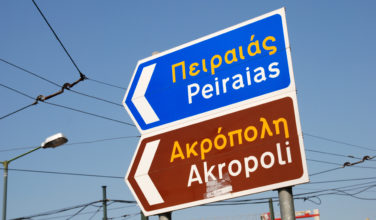Vocabulary for Expressing Where You’re From in Greek
Comments Off on Vocabulary for Expressing Where You’re From in Greek
 When conversing with people in the Greek language, you will naturally be curious about where people are from, and they will also be curious about you. This means that when learning Greek, you need to become familiar with the vocabulary that involves this. Here’s a look at some of the basics you will need to know:
When conversing with people in the Greek language, you will naturally be curious about where people are from, and they will also be curious about you. This means that when learning Greek, you need to become familiar with the vocabulary that involves this. Here’s a look at some of the basics you will need to know:
Asking Someone Where They’re From
When talking with someone in Greek, they will likely become curious about where you’re from and at the same time, you might be curious about them.
- Informal: Από που είσαι; Apo pou eessai? Where are you from?
- Formal: Από πού είστε; Apo pou eestai? Where are you from?
As you can see, there is both a formal and informal version of this question. Generally, if you haven’t met the person before you should use the formal version unless they have been addressing you in the informal form during the course of your conversation, You should also use the formal form of a word when addressing officials such as politicians, police, military, and more even if they have been addressing you in the informal. When you aren’t sure, you should always use the formal version. If they want you to address them informally they’ll let you know.
How to Tell People Where You’re From
Once you are asked where you’re from, you’ll need to answer. Each of the sentences begin with είμαι από (eemai ap0), which means “I am from”. Here are some of the responses:
- I am from America – είμαι από την Αμερική – eemai apo tin Ameriki (Note that Greeks are more likely to use the word “America” in conversation over the United States.)
- I am from the United States – είμαι από τις Ηνωμένες Πολιτείες – eimai apo tis Inomenes Politeies (However, to clarify where you’re from, it is perfectly okay to say you’re from the United States!)
- I am from Boston – Είμαι από τη Βοστώνη – Eimai apo ti Vostoni
- I am from New York – είμαι από την νέα Υόρκη – eimai apo tin nea Yorki
- I am from Los Angeles – Είμαι από το Λος Άντζελες – Eímai apó to Los Ántzeles
- I am from Canada – είμαι από τον Καναδά – eimai apo ton Kanada
- I am from England – ειμαι από την Αγγλια – eimai apo tin Anglia
- I am from Australia – Είμαι από την Αυστραλία – Eímai apó tin Afstralía
As you notice from the list above, the Greek language has specific words for each of the places. You should memorize the Greek way of saying where you’re from just in case someone asks. You’ll also notice that “από” is followed by την, τις, το, τη, etc. This is something related to the grammar of the sentence. Each place has it’s own gender, which means the article will change.
When memorizing the place where you’re from, make sure to also memorize the gender so you can use the right grammatical form to express it. You can find this information in a Greek to English dictionary or you can even use Google’s Translate tool.
The Learn Greek section on GreekBoston.com was written by Greeks to help people understand the conversational basics of the Greek language. This article is not a substitute for a professional Greek learning program, but a helpful resource for people wanting to learn simple communication in Greek.
Categorized in: Learn How to Speak Basic Greek
This post was written by Greek Boston





